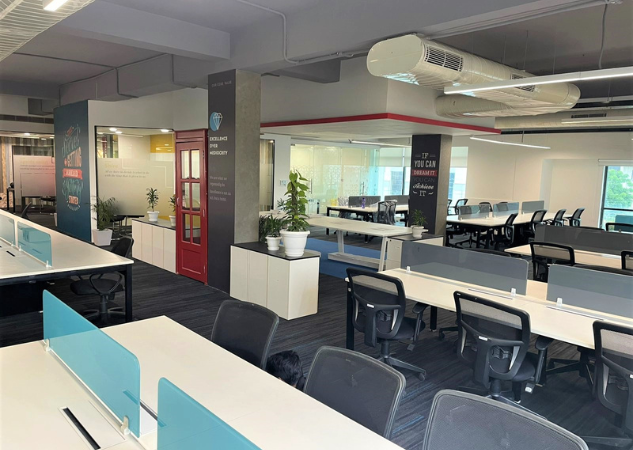Performance marketing has become a critical strategy for small and medium enterprises (SMEs) in today’s digital world. With limited budgets and the need for measurable results, SMEs rely on performance marketers to drive growth. Performance marketing focuses on achieving specific outcomes like clicks, conversions, or sales, ensuring every marketing rupee spent has a return. This blog enlists ten key ways performance marketers play a crucial role in the success of SME businesses.
💡 Are you looking for Coworking space in Gurgaon, Noida or Delhi? We are just a call away.
Call Now: 08999 828282
10 Key Roles of Performance Marketers in the Success of SME Businesses
- Measurable Results
- Cost-Effective Approach
- Targeted Advertising
- Improved Conversion Rates
- Scalability
- Real-Time Data and Insights
- Flexibility and Adaptability
- Increased Brand Visibility
- Customer Acquisition
- Maximizing ROI
1. Measurable Results
Performance marketing is entirely data-driven. Marketers set clear goals and track every action, from website visits to purchases. This makes it easy for SMEs to understand the impact of their marketing efforts and measure their return on investment (ROI) accurately.

2. Cost-Effective Approach
SMEs often operate with tight budgets, and performance marketing is perfect for them as it is based on paying only for desired actions. Whether it’s a click, lead, or sale, performance marketers ensure that SMEs only pay for results, making their marketing spend efficient and effective.
3. Targeted Advertising
Performance marketers use tools like Google Ads, social media platforms, and programmatic advertising to reach the right audience. By analyzing consumer behavior and interests, they ensure that SMEs can focus on potential customers who are more likely to convert, reducing wasted advertising spend.
Also Read: Importance Of SME Insurance For Entrepreneurs
4. Improved Conversion Rates
A key goal of performance marketers is to improve the conversion rate – turning visitors into customers. They do this by continuously testing and optimizing ads, landing pages, and call-to-action buttons, making it easier for SMEs to get more value out of their online traffic.
5. Scalability
Performance marketing strategies can be easily scaled as SMEs grow. If a particular campaign is successful, businesses can increase their investment and expand the reach of their ads. This allows SMEs to scale their efforts without taking big financial risks.
6. Real-Time Data and Insights
Performance marketers provide SMEs with real-time data and insights on their campaigns. This means businesses don’t have to wait for a campaign to end to see results. They can make adjustments on the go, ensuring that marketing efforts are always optimized for maximum returns.
7. Flexibility and Adaptability
SMEs often need to pivot their strategies quickly due to changes in the market. Performance marketing is flexible and can be adapted at any time. Marketers can tweak campaigns, adjust budgets, or switch platforms instantly based on real-time data, ensuring that marketing efforts remain effective even during shifts in the business environment.
8. Increased Brand Visibility
While performance marketing is often focused on conversions, it also helps increase brand visibility. By appearing on search engines, social media, and other online platforms, SMEs can make their brand known to a wider audience, creating long-term benefits in brand recognition and trust.
💡 SMBs looking for HR, Marketing, Technology and Funding solutions for their business.
Call Hello Jarvis 994 8000 800
9. Customer Acquisition
One of the primary goals of performance marketing is acquiring new customers. By using strategies like pay-per-click (PPC) advertising, affiliate marketing, and retargeting, performance marketers ensure that SMEs can attract a steady flow of new customers, helping businesses grow sustainably.
10. Maximizing ROI
Performance marketers use various optimization techniques like A/B testing, keyword targeting, and audience segmentation to get the most out of the marketing budget. This ensures that SMEs are getting the highest return on their investment, helping them grow and compete in a crowded market.
To conclude, performance marketers play a vital role in helping SMEs grow and thrive in a competitive landscape. By focusing on measurable, cost-effective, and targeted strategies, they ensure that every marketing effort brings tangible results, driving business success. The Office Pass(TOP) offers flexible, collaborative coworking spaces designed to support entrepreneurs and their teams. With access to vibrant workspaces, networking opportunities, and a productive atmosphere, TOP empowers founders to focus on what matters most—growing their business. By integrating performance marketing into their overall strategy, SMEs can unlock new avenues for growth and innovation. Feel free to reach out for more details at 08999 828282.
FREQUENTLY ASKED QUESTIONS (FAQS):
Question: What is a performance marketer?
Answer: A performance marketer is a person who helps businesses grow by running online ads, improving website visits, and driving sales. They focus on measurable results, like how many people clicked on an ad or made a purchase.
Question: How does a performance marketer help an SME?
Answer: Performance marketers help small businesses by creating cost-effective ad campaigns that attract customers and improve sales. They know how to target the right audience to get the best results with the budget available.
Question: Why is performance marketing important for small businesses?
Answer: For small businesses, performance marketing can bring quick results without high costs. It’s ideal for building brand awareness and growing sales in a way that’s easy to track and adjust based on what works best.
Question: What skills should a good performance marketer have?
Answer: A good performance marketer should understand digital ads, analytics, social media, and know how to optimize campaigns to get better results. They should also be creative with ad designs and able to analyze data to improve performance.
Question: How do performance marketers measure success?
Answer: They look at metrics like clicks, conversions, and return on ad spend (ROAS). These metrics show if people are interacting with ads and if those ads are leading to sales or other important actions for the business.
Question: How can an SME find the right performance marketer?
Answer: SMEs can look for performance marketers with experience in their industry, a proven record of results, and the ability to work within a limited budget. Referrals and checking online reviews can also help find a good fit.
Question: What digital channels do performance marketers use?
Answer: They use channels like Google Ads, Facebook Ads, Instagram, LinkedIn, and sometimes even TikTok, depending on where the SME’s audience spends time online. They choose the best platforms based on the business goals and target audience.
Question: How much budget should an SME allocate for performance marketing?
Answer: The budget varies based on the business size, industry, and goals. Some SMEs start with a small budget to test what works and then scale up. A performance marketer can help decide on the right amount based on the expected return.
Question: What’s the difference between performance marketing and traditional marketing?
Answer: Performance marketing is focused on measurable results, like clicks and sales. Traditional marketing, like TV ads or billboards, is harder to track. Performance marketing allows SMEs to see direct outcomes from their efforts.
Question: How can an SME measure if performance marketing is working?
Answer: SMEs can measure success by tracking metrics like customer engagement, conversion rates, and sales growth. If these metrics improve over time, it’s a good sign that performance marketing is helping the business grow.



